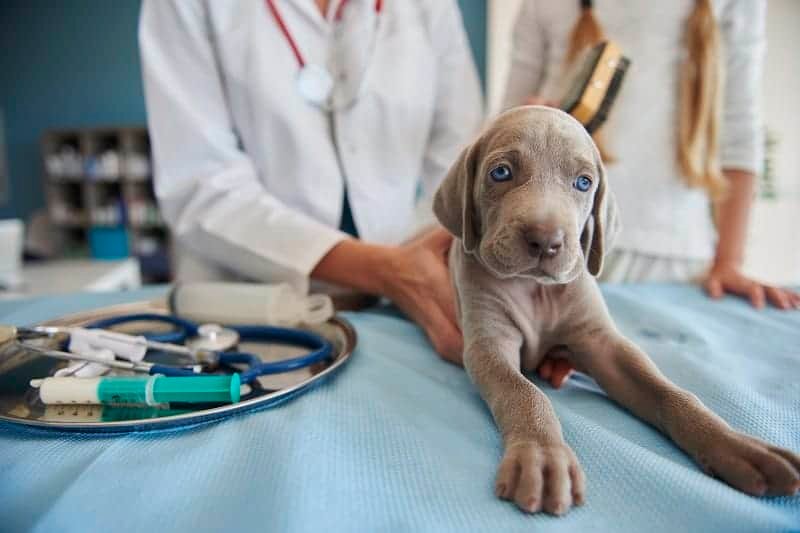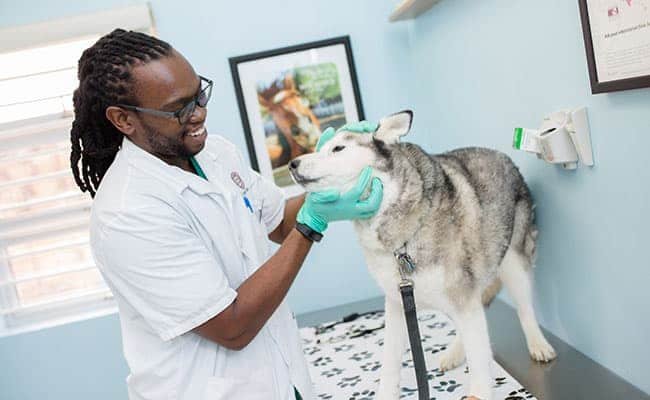Top 3 Vet Schools in the Caribbean in 2023

Veterinary medicine is a good career choice and one way to stand out is to study in a good veterinary college. As a result, we have put together a list of the top vet schools in the Caribbean that you can select from.
With the knowledge that you will gain from studying veterinary medicine at one of the top veterinary universities in the Caribbean, you will eventually become a force to reckon with in this field.
Also in this article, you will learn about the cost of attending veterinary schools in the Caribbean as well as what it takes to become a vet in the Caribbean.
You will also see the major factors to consider before going to vet schools in the Caribbean and find answers to some of the frequently asked questions.
If you wish to explore other school options, then you may want to also read about the Top 10 Vet Schools in New York and The Top 6 Vet Schools in Tennessee.
Now, let’s get to the details of this article.

What is Veterinary Medicine?
Veterinary medicine is a branch of medicine whose specialists deal with the prevention, diagnosis, treatment of diseases, and injuries in animals.
This is a broad practice that involves all kinds of animals, their species, and the diseases they suffer.
As a broad range of expertise, the doctor in charge often works with other paraprofessionals with specific specialisms such as animal physiotherapy or dentistry.
This course of study teaches you all the things you need to know about animals and how to take care of them when they are sick.
Who is a Veterinarian?
By now, you should have known who a veterinarian is.
A veterinarian is a health professional who studies and practices veterinary medicine.
Veterinarians are also known as veterinary physicians, veterinary surgeons, or simply vets.
If you follow the regular TV show known as Incredible Doctor Pol then you should know that he is a veterinarian.
“Veterinarian” is an umbrella title that houses the specialties in veterinary medicine.
Such specialties include;
- Veterinary surgeon
- Veterinary physician
- The veterinary assistant.
- The veterinary technician etc
Find out more about vet schools in the Caribbean below.
What Exactly Does a Veterinarian Do?
Veterinarians treat the injuries and illnesses of pets and other animals with a variety of medical equipment, including surgical tools and x-ray and ultrasound machines. They provide treatment for animals that is similar to the services a physician provides to humans.
Depending on your specialty in the veterinarian career structure, your specific involvement and role will differ. For instance, a veterinary surgeon does not handle technical duties as that is majorly for the veterinary technician.
In order not to have a clash of duties, every specialist has his or her role under the Veterinarian umbrella, and this is largely determined by your course of study.
To expound a little bit more on their role, here are some of the duties of a Veterinary doctor;
- Vets advise animal owners about the precise maintenance of their pets and their livestock.
- Veterinarians assist in the prevention and control of animal and human diseases to promote public health.
- Administers immunizations and conducts physical examinations on animals.
- Provides emergency care, surgery, and dental procedures on animals.
- Prescribes medications and euthanizes animals.
- As an epidemiologist, vets examine disease outbreaks of animals and humans like foodborne diseases, influenza, plague, rabies, AIDS, and encephalitis.
- Furthermore, they assess the safety of food processing plants, restaurants, and water supplies.
- Vets add to scientific publications to help graduate veterinarians acquire new knowledge and skills.
Why Should I Study In A Caribbean Vet School?
Let’s not talk about the great scenery and unique lifestyle of the Caribbeans, studying in the Caribbean is a great experience.
Besides that, Caribbean veterinary schools are really less expensive when compared to other alternatives for veterinary studies.
Also, Caribbean vet schools offer DVM programs to national and international students.
Asides from the fact that studying vet medicine in the Caribbean is quite affordable, studying in the Caribbean allows you to study in one of the most beautiful locations on earth.
What Does it Take to Become a Veterinary Doctor in the Caribbean?
Becoming a veterinary doctor in the Caribbean is a great feat.
However, to get started on that path, you need to get at least training or experience from any of the Best Veterinary Schools in the world.
That’s why we have put this piece together to give you a heads up on the schools for Veterinary students in the Caribbean if you choose to study in the Caribbean.
A degree from a veterinary school or college is necessary to make a career in this field.
We have gathered the list of Veterinarian colleges in the Caribbean for students who want to study veterinary medicine.
However, before I walk you through that, there are some of the processes that will give you a firm footing to start this veterinary journey.
To become a veterinarian, you have to;
- Graduate High School, do 4 years in veterinary medicine or science, and 2 years as a veterinary technician.
- Then complete an accredited vet tech program which may take 2 to 4 years.
- Lastly, take the VTNE (Veterinary Technician National Exam).
If you are looking for help to do your homework for becoming a veterinarian, there is a reliable source available.
What is the Cost Of Attending Veterinary Schools in the Caribbean?
Before we talk about the Vet Colleges and schools in the Caribbean, you need to know the tuition cost of Veterinary Schools in the area.
Keep in mind that the cost will differ based on the following reasons;
- School Status: private or public?
- Program of study: undergraduate or master’s degree?
- Even in private or public schools, the tuition fee depends on the school.
However, as we stated earlier, vet schools in the Caribbean cost less than most other locations.
Students pay less than in-state vet schools but still spend more than $200,000 for a D.V.M. on average.
The average cost of four years of veterinary school is more than $200,000 for in-state students and $275,000 for out-of-state students, according to the VIN Foundation.
Major Factors To Consider Before Going to Vet Schools in the Caribbean.
Before making an advance to apply to study in the Caribbean vet schools and colleges ensure you put these key factors into consideration.
Veterinary colleges in the Caribbean are highly recommended, however, you need to consider the following points before making a choice;
- Accreditation
- Acceptance Rate
- Number of Programs.
- Graduation & Employment Rate.
Best Veterinary Schools For Veterinary Students In the Caribbean.
Before we proceed, it’s ideal to know that there are just a few schools that offer Veterinary programs in the Caribbean.
There are just three vet schools in the Caribbean that offer top-notch educational orientation that aligns with the 21st-century vet medicine practice.
And these colleges have a track record of offering the best veterinary training in the Caribbean and compete with most colleges in the whole of the USA.
Without further ado, here is a list of colleges for Veterinary medicine, tech, and other related courses in the Caribbean.

#1. Ross University Veterinary college:
- Location: Basseterre, Saint Kitts and Nevis.
- Vet Programs Offered:
- Vet prep
- Dual degrees
- DVM program
- Graduate programs.
Ross University does not just train students in the career profession, they also fashion students to develop adaptability, resilience, and patience fostered by island life and a rigorous academic program.
Hence one of the reasons they are the best vet schools in the Caribbean.
To make it into Ross University to study vet medicine, you need to be passionate, excellence-driven, and resourceful.
Ross University Veterinary college Admission requirements
- English competency
- 150+ hours of work experience
- Cv Or Resume (Optional)
- 48+ Credits of college work
- Official Undergraduate Transcripts
- Two Letters Of Recommendation
- Personal essay or VMCAS Personal Statement
- GRE, (optional for incoming 2021 and 2022 semesters)
#2. St. George’s College of Veterinary Medicine:
- Location: island of Grenada
- Vet Programs Offered:
- DVM/MSc
- DVM/MPH
- DVM, MBA
- Veterinary medicine PhD
Next on our list of Caribbean vet schools is St. George’s College of Veterinary Medicine.
St. George’s College of Veterinary Medicine gained accreditation in 2011 from both the American Veterinary Medical Association Council on Education (AVMA COE) in the United States and Canada and the Royal College of Veterinary Surgeons (RCVS) in the United Kingdom.
Since its inception in 1999, St. George has graduated over 1,900 veterinarians.
From an estimate, for all years you will spend at St. George’s College of Veterinary Medicine, the tuition cost will be around $197,595.
St. George’s College of Veterinary Medicine Admission requirements
- Official secondary school transcripts.
- Application fee: $50 US for pre-veterinary medical and veterinary medical sciences.
- Undergraduate coursework transcripts must be submitted by the undergraduate institution.
- Official TOEFL or IELTS scores if English is not your principal language.
- Two letters of recommendation. In order of importance to the Committee on Admission, these are the categories:
- A veterinarian with whom you have worked
- Also, a university professor (or, for those applying for the pre-veterinary program, a teacher)
- A pre-veterinary advisor committee, or an advisor/counselor
- A 1,500-word personal statement discussing the significant factors that led to your decision to pursue a career in veterinary medicine and how you see yourself using this career to make a difference in the world
#3. St. Mathew’s University School of Veterinary Medicine
- Location: Grand Cayman island
- Vet Programs Offered:
Last on our list of best vet schools in the Caribbean is the St. Mathew’s University School of Veterinary Medicine.
St. Mathew’s University School of Veterinary Medicine is accredited by the American Veterinary Medical Association (AVMA).
The cost of attending the St. Matthew’s University School of Veterinary Medicine is about $200,492.
St. Mathew’s University School of Veterinary Medicine Admission requirements
- Complete the online application form
- Submit the application fee – SMU has waived their usual application fee of $75 (U.S.) for September 2021 entry! Simply enter this code when prompted on the application form: 2701434.
- Tender the following documents – Transcripts, personal statement, resume, and two letters of recommendation
- Show language proficiency – Applicants whose principal language is not English may be required to take the test of English as a Foreign Language (TOEFL).
- Click here to begin the application process.
Frequently Asked Questions About the Best Vet Schools in the Caribbean.
Does the Caribbean Have Online Distance Programs For Veterinary Programs?
No, at the moment, there are no online veterinary programs in the Caribbean.
How Many Vet Schools Are in the Caribbean?
There are just 3 veterinary schools in the Caribbean.
What’s the Duration of Veterinary Studies in the Caribbean?
Becoming a veterinary technician in the Caribbean vet schools takes 2 years to complete.
That earns you an Associate degree in Veterinary Technology.
However, becoming a veterinary doctor or surgeon requires you to earn a bachelor’s, master’s, or PhD in Animal Sciences, veterinary medicine, or public health.
That takes 4 years.
Are Vet Schools and Colleges in the Caribbean Accredited?
Yes, the Caribbean vet schools and colleges are accredited by the Committee on Veterinary Technician Education and Activities (CVTEA), the accrediting body of the American Veterinary Medical Association (AVMA).
Where Are Veterinary Technicians Employed in the Caribbean?
Vet techs in the Caribbean work in places such as
- Clinics.
- Farms
- Zoos.
- Shelters
- Kennels.
- Universities
- Wildlife centers.
- Veterinary hospitals
- Aquariums
- Animal control facilities
- Animal rescue centers
- Government regulatory agencies
- Biomedical research labs
- Specialty clinics (e.g., avian, equine),
Summary
Besides the fact that you get to enjoy the great weather and scenery of the Caribbean, there’s no doubt that becoming a vet student in the Caribbean takes commitment and patience.
However, if you’re able to make it into one of the best vet schools in the Caribbean, you have one problem solved.
By following through with our recommendations on the best vet schools in the Caribbean, you will surely become a vet doctor or technician well trained.
Keep in mind that each of the three Caribbean veterinary schools has its advantages.
Ensure you go through each school’s official website for more details on how to apply.





